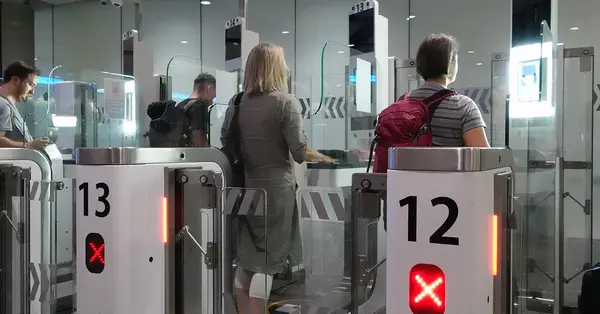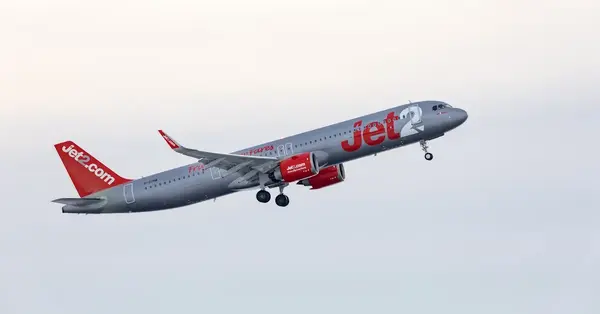Wizz Air targets growth in UK amid strong demand

Wizz Air UK managing director Marion Geoffroy hailed Britain’s enthusiasm for travel as the airline marked a return to full-year profit and record passenger numbers.
The airline, which reported a net profit of €365.9 million in its most recent results, carried a total of 62 million passengers in the financial year up to March 31, including more than 12 million from the UK.
Geoffroy said: “UK travellers will never give up travelling – they will only give up if they’re restricted or prohibited from travelling. In the last two years there have been a lot of questions about cost of living and inflation, but there’s still demand.”
Hungary-based Wizz Air operates from seven UK airports – Aberdeen, Birmingham, Glasgow, Liverpool, Leeds Bradford, Gatwick and Luton – with flights currently offered to 98 destinations.
“The plan is to grow in the UK subject to market availability,” said Geoffroy, adding that the airline would “very much welcome” greater capacity in London.
“In relation to other bases, we are constrained in terms of aircraft numbers,” she said. “There is no plan for 2024, but this is something we are exploring because it’s a very dynamic market and there is still strong demand for the summer and beyond.”
Since March, the airline’s UK fleet has been entirely composed of Airbus A321neo aircraft, said Geoffroy, which has allowed more passengers to be carried while reducing emissions and noise.
Asked whether Wizz Air would be able to maintain low fares, given industry warnings about the rising costs of operating, Geoffroy said the airline was determined to continue minimising its cost base.
“At the end of the day, cost matters more than revenue – we can control costs, but we don’t really influence revenue. Therefore, if our cost base is the lowest in the industry, then we will be the structural winner,” she said.
Geoffroy added that the sector could see fare rises linked to “constrained supply due to aircraft shortage”, pointing to delivery delays, Boeing groundings and additional engine inspections being carried out by Pratt & Whitney.
Outlining recent trends identified by Wizz Air, she said central and eastern European countries are becoming increasingly popular among UK travellers.
“We’ve seen an interesting shift from more traditional destinations, such as Spain, Greece and Portugal, to more off-the-beaten-track destinations,” she said, listing Albania, Romania and Serbia as some of the in-demand countries.
“It’s probably a generational trend,” Geoffroy added. “People in their 30s will have travelled with their parents to Barcelona, Madrid, Lisbon, and now they want to explore places where they haven’t been before with their family.”
Budapest has consistently been a strong performer, Geoffroy said, with “full flights” operating thrice daily from Luton and once a day from Gatwick.
“The ticket is cheap with us, but the destination is also cheap. It’s cheaper than going to Brighton or other cities in the UK, which are great but pretty expensive,” she added.
Describing Wizz Air’s strategy on cutting emissions, Geoffroy said sustainable aviation fuel (SAF) is a key plank of the airline’s approach and she noted that it had invested in producers including Firefly and CleanJoule.
“SAF is at the heart of our environmental sustainability agenda because we believe it’s going to be a long bridge between today and the new aircraft technology that’s going to deliver a zero-emissions aircraft – we’re talking about decades,” she said.
The airline is working with the fuel suppliers to make SAF “more affordable”, she added, but other ways of cutting emissions are also being rolled out.
“For example, we now do single-engine taxi. So we leave the parking stand at the airport with only one engine running to go to the runway and the same when we come back and we save a certain amount of fuel,” said Geoffroy.
“There are a lot of initiatives on top of SAF that we are looking at,” she added.
Wizz Air’s full-year financial results showed the airline had overturned the loss of €535.1 million recorded in 2023.
Geoffroy hailed the “strong” performance and highlighted areas where costs had been reduced, before going on to explain the €80 million impact of conflict in the Middle East.
Although capacity was diverted from Israel following the Hamas terrorist attack on October 7, 2023, Geoffroy said the airline struggled to sell seats on other routes given the short timeframe. Flights to Israel resumed on March 1, she added.
The airline stopped flying to Ukraine after the Russian invasion, but plans to return in due course.
“When it’s the right time to go back, we’ll go back,” Geoffroy said.
A total of nine routes have been launched or restarted from the UK since last summer. They are Luton-Chi?in?u (flights resumed), Glasgow-Budapest, Glasgow-Bucharest, Luton-Brasov, Luton-Cairo, Gatwick-Prague, Gatwick-Hurghada, Luton-Salzburg and Gatwick-Varna.
You have viewed both of your 2 free articles this month as an unregistered user
To continue reading free of charge, please
If you have registered previously, please complete your details to login:

















